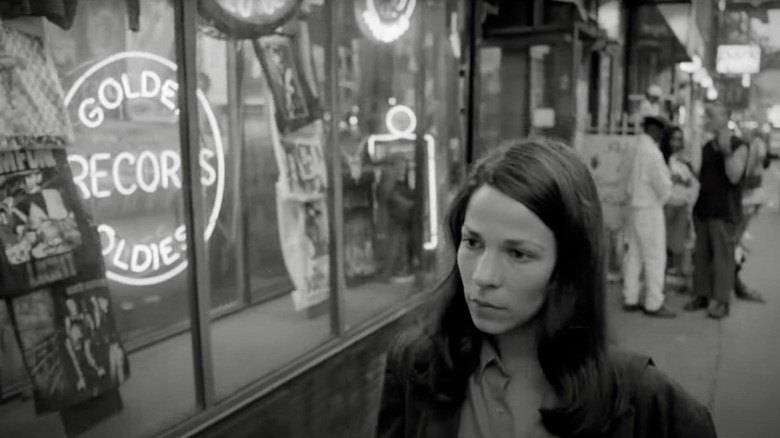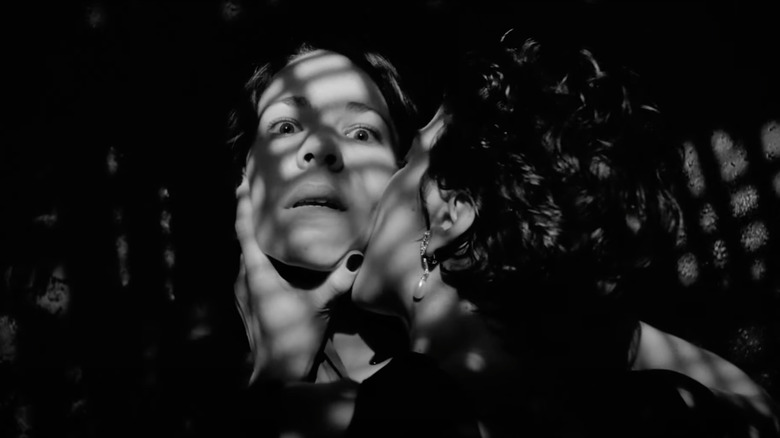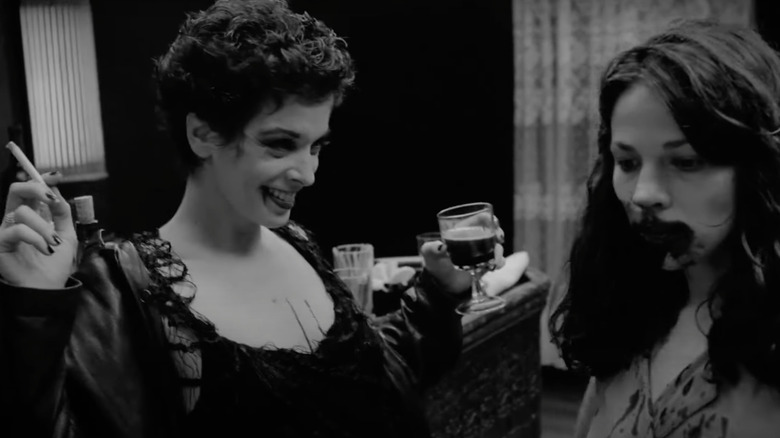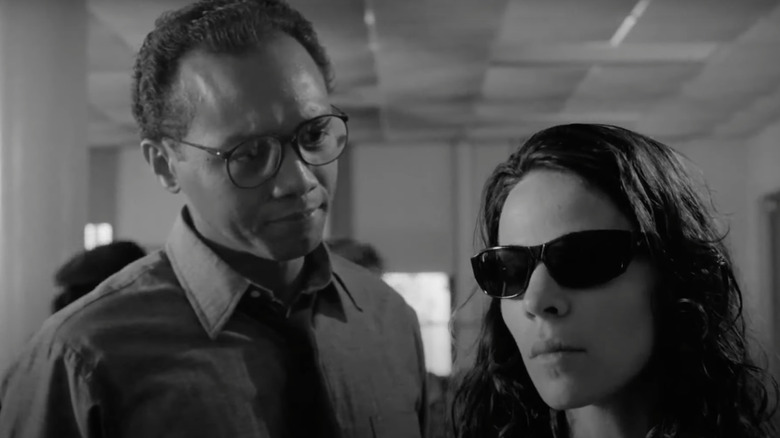Year Of The Vampire: The Addiction Bites Into Dependency And The Problem Of Evil
We may receive a commission on purchases made from links.
(Welcome to Year of the Vampire, a series examining the greatest, strangest, and sometimes overlooked vampire movies of all time in honor of "Nosferatu," which turns 100 this year.)
Though it sounds like the key to unlocking the whole movie, the title of "The Addiction" is not necessarily as straightforward as it seems. Filmed in crisp black-and-white, Abel Ferrera's 1995 indie vampire film stars Lili Taylor as Kathleen Conklin, an NYU philosophy student who gets cornered and assaulted in a dark alley one night by a bloodsucking "Casanova" with the face of Annabella Sciorra.
Two other future "Sopranos" stars, Edie Falco and Michael Imperioli, are joined by "Pulp Fiction" alumni Christopher Walken and Paul Calderon for a movie where vampirism, as an addiction metaphor, is very much in play (per the title). There are references to dependency and the AIDS virus. As Kathleen walks the streets of New York at night, she's accompanied by the Cypress Hill song "I Wanna Get High." While recovering from Casanova's bite, she convulses as if going through drug withdrawals.
Walken's character shows up later as a functional addict who preys on other vampires. "My habit is controlled by my will," he says. Offscreen, Taylor struggled with alcoholism and Ferrera struggled with heroin addiction.
However, the film, written by Nicholas St. John, opens with talk of war crimes. It juxtaposes images of Nazi atrocities as Kathleen draws her first blood from a homeless man with a needle and injects it into her veins.
More than just provocations from Ferrera — a filmmaker with a background in pornography, slasher video nasties, and rape revenge movies — these moments build toward broader meaning in "The Addiction." Nominated for two Independent Spirit Awards, it's a film that is profoundly concerned with the more universal question of the problem of evil.
What it brought to the genre
When I was an undergrad, I served as a teaching assistant for a professor who wrote the book on vampires — more than one of them. In her lectures, she talked the way I write (better than I speak), and I remember her once joking about the "intellectual masturbation" of academia, which I took to mean, people massaging their brains with knowledge and getting caught up in a world of pedantic name-dropping.
Kathleen Conklin is very much a protagonist cut from that cloth. Her dialogue reflects her characterization as an angst-ridden PhD candidate, infusing "The Addiction" with a philosophical pomposity that she then spits back in the face of her fellow academics at the end.
The vampires in "The Addiction" invite themselves across the threshold of a person's life, and it's up to their potential victims to rebuff them and do so forcefully. On one level, the bloodsuckers, rather than just their thirst, serve as the personification of addiction.
Casanova grabs Kathleen by the wrist and throws her up against a wall, challenging her with the words, "Look at me and tell me to go away." She accuses Kathleen of being a "collaborator" after she drinks her blood. While there are overtones of sexual assault to this scene — something Sciorra endured in real-life and testified about at Miramax co-founder Harvey Weinstein's trial — this is not to suggest that the film is victim blaming in that sense.
What's at stake here is the addict's penchant for enabling their own self-destruction. After she becomes a vampire, Kathleen attaches herself to other human hosts, asking them questions like, "Why don't you tell me to leave you alone?" and "Why didn't you say get lost like you really meant it?" She tells one of them, "It was your decision."
'Our addiction is evil'
As the viewer gets deeper into "The Addiction," the film diverges from dependency into a larger examination of human nature and the evil in the world. Early on, we hear Kathleen's professor discussing religious determinism in class, explaining how an aspect of it is that "the unsaved don't recognize the sin in their lives" and "don't suffer pangs of conscious because they don't recognize evil exists."
She later equates herself, as a vampire, with sin when she tells one of her victims, "Look sin in the face and tell it to go." Finally, she has an epiphany, saying in voiceover, "Our addiction is evil. The propensity for this evil lies in our weakness before it."
Willpower, therefore, in "The Addiction" is not just something to be applied to substance abuse, but rather any form of temptation. The film recognizes that when one stands before the precipice of wrongdoing, "there's a difference between jumping and being pushed." Yet it implies we as humans are culpable if not outright responsible for the evil we see. This sounds like a no-brainer, but the problem of how to reconcile the world's evils with the existence of an all-powerful God is one that has invited debate for centuries.
"The Addiction" posits that evil is a byproduct of free will. If we didn't have the ability to choose between right and wrong, it wouldn't mean as much when we choose right. And as easy as it is to blame a higher power for allowing bad things to happen, the alternative scenario would involve said deity swooping down every single time a human is about to perpetrate evil. There would be no conflict in the world, but in movies and TV, at least, conflict is one of the essential building blocks of storytelling.
'Suffering is good'
Though it seems warped, from a narrative perspective, the real problem might be a world without evil, a story without conflict. Kathleen's professor, sounding like a writing instructor encouraging students to make their characters suffer, even comes out and says, "Suffering is good." Questioning it would be like asking, "Why did George R.R. Martin allow the Red Wedding to happen?"
This is all very abstract and perhaps specious, but just when "The Addiction" threatens to get lost down its own navel, the movie reveals that Kathleen's victims are alive/undead and she is now the head vampire. She tells the guests at her graduation party, "I'd like to share a little bit of what I've learned through these long, hard years of studying."
What follows next is a bloodbath. Kathleen overdoses on blood and awakes in a hospital with a crucifix over her bed. She had previously raged against the idea of submitting to a higher power, but now she's ready to seek forgiveness.
I'm not Catholic, but in the Year of the Vampire, I've come to appreciate that there's a virulent strain of writers and directors who have brought that background into their work, either to embrace it or reject it. You can see it from St. John and Ferrera to Guillermo del Toro, Anne Rice, and Park Chan-wook. It makes sense given the explicit parallels between vampiric bloodsucking and the communion rite of drinking Christ's blood.
Kathleen finds herself in need of grace and partaking of the latter. "The Addiction" is a thought-provoking film, but if it's a humanistic message you're looking for, it suggests that may be at odds with a fallen world where "we do evil because we are evil" and "drink to escape" that fact — if not blood, then certainly denial of sickness.



